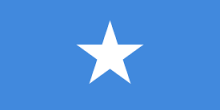6th October 2015 – The Somali National Intelligence and Security Agency (NISA) raided the offices of privately owned Universal TV in Mogadishu on 2 October 2015 and arrested Abdullahi Hersi, the station’s East Africa director, and Awil Dahir Salad, a producer.
The two journalists have not been charged and according to local sources, the General Prosecutor has given NISA 21 days to conduct its investigation. During this time, the journalists will remain in Godka Jilacow prison. They have been denied access to a lawyer and Universal TV’s broadcast signal has been suspended indefinitely by NISA agents.
“Journalists in Somalia are faced with extremely strenuous working conditions, and this incident is yet another example of the government’s persistent crack down on media workers”, said Hassan Shire, Executive Director of the East and Horn of Africa Human Rights Defenders Project (EHAHRDP). “The two journalists should be immediately released, and Universal TV’s broadcasting signal restored. At the eve of the 2016 Somali elections, it is crucial for the media to be able to engage with the government on issues of public concern.”
The arrests and raid of the station took place after the broadcast of a show called Doodwadaag on 1 October. The show saw two elected members of parliament discuss the presence of foreign troops, including Ethiopian troops, in Somalia as part of the African Union Mission in Somalia (AMISOM), as well as the motion of no confidence against the Somali government.
This incident is part of a greater and extremely worrying government-led crack down on the media for discussing sensitive issues or expressing criticism of the government.
In April 2015 twenty-five journalists were detained and two radio stations – Radio Shabelle and Sky FM – closed down, following their coverage of an Al Shabaab attack in Garissa, Kenya. One of the media networks, Radio Shabelle, had only begun broadcasting again in March 2015, after authorities raided its offices in August 2014 and arrested three journalists.
Somali media workers are concerned about a draft media law endorsed by the Somali Cabinet in September 2014 which gives the National Media Council the power to impose severe sanctions, including fines of US$5,000 to $10,000, on journalists and media houses. The United Nations Independent Expert on Somalia, Bahame Tom Nyanduga, expressed concern in his most recent report to the Human Rights Council that “the draft legislation contains broad definitions that could be used to restrict media activities, places restrictions on who can practice journalism, criminalises defamation and imposes penalties that are disproportionate to the offences. The draft legislation also has prohibitive licensing requirements which would have the effect of restricting the operation of media houses.”
The most recent arrests come amidst reports of the arrest of two other journalists in Berbera, Somaliland, on 5 October, by the Somaliland government.
Journalists in Somalia are working in a space threatened not only by the government of Somalia but also the terrorist organization Al Shabaab.
In May 2015, a directive was issued by the government ordering media workers to stop using Al-Shabaab’s name and to refer to them as “the group that massacres the Somali people.” This directive, if enforced, will make sensible and lawful news reporting and public debate about matters of genuine national concern virtually impossible. Furthermore this directive could endanger the lives of journalists, as Al Shabaab has threatened the lives of journalists who follow this directive.
In April 2015, a photographer for the websites of Radio Mogadishu and the state-run Somali National Television was shot on his way home. He covered clashes between government troops and Al Shabaab militants and may have been targeted by the group for working for state-run media.
For further information, please contact:
Hassan Shire, Executive Director, East and Horn of Africa Human Rights Defenders Project on: [email protected] or +256 772 753 753 (English and Somali)
Clementine de Montjoye, Advocacy & Research Officer, East and Horn of Africa Human Rights Defenders Project on: [email protected] or +256 752 183 305/ +33 6 58 56 26 50 (English and French)
Kafia Omar, Special Programs Officer, East and Horn of Africa Human Rights Defenders Project on: [email protected] or: +256 77 58 78 392 (English and Somali)

